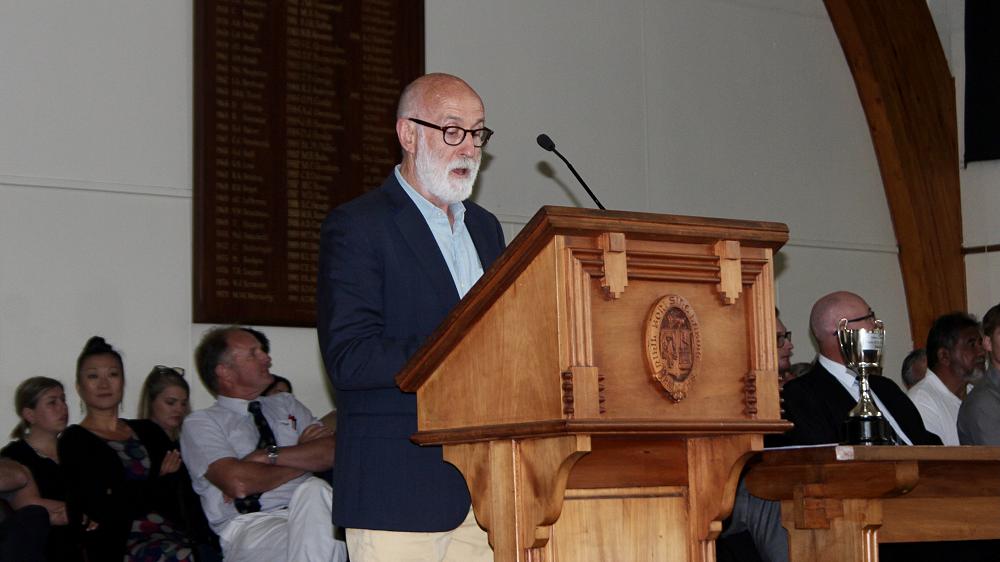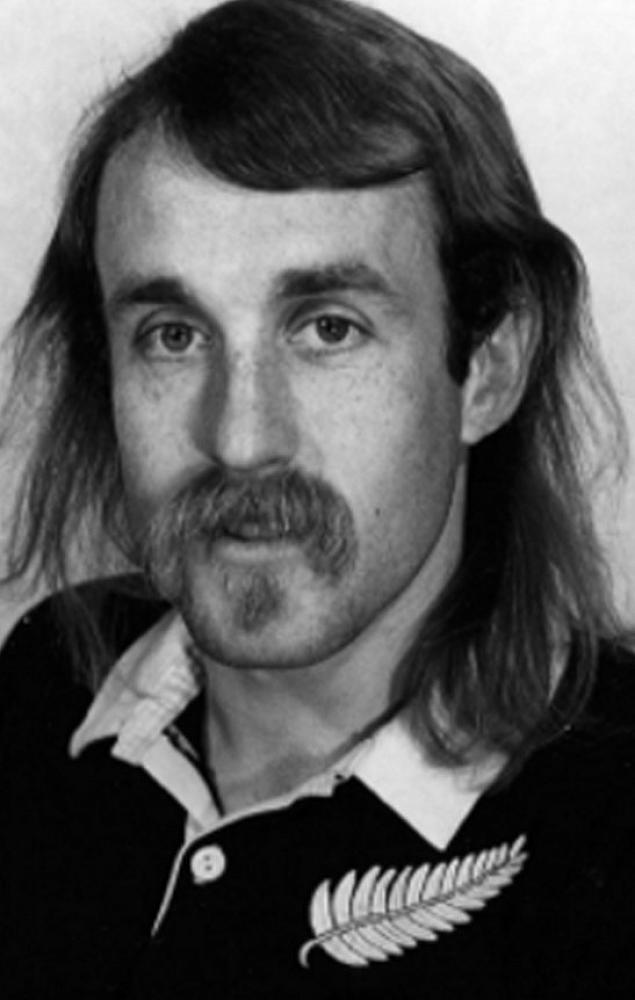
Old Boy and Former All Black Dr. Bob Burgess Presents at Assembly
Old Boy and former All Black Dr. Bob Burgess was the guest speaker at a recent school assembly. While Dr. Burgess’ sporting prowess is itself notable, it was his decision to follow his moral convictions and turn down an All Black trial that was the basis of his presentation.
While at PNBHS Dr. Burgess was a talented all-round sportsman and academic, as outlined below. He was selected to play for the Manawatū rugby team soon after leaving school as an 18-year-old in 1967. His good form for the side saw him selected to play for both the New Zealand Junior All Blacks and New Zealand Universities rugby teams in 1968.
By 1970 Dr. Burgess had moved to Southland and it was there that he was approached by a selector and asked if he would accept a nomination to take part in that year’s All Black trial. ‘No thanks, I’m not available.’ was his immediate response. Dr. Burgess explained that as he said these words, he was aware that playing for the All Blacks had been his lifelong dream and he was now turning the opportunity down. He then added ‘I’m not available because of apartheid in South Africa and the way they run their sport – I’d like that to be known.’
Dr. Burgess believed that if he didn’t act on his beliefs and make a stand, his lack of action would effectively be supporting apartheid. He was fundamentally opposed to the position of the New Zealand Rugby Union, who went along with the South African stipulation that only ‘whites’ were allowed to tour there. This meant that Māori and Pasifika rugby players were ineligible for selection for All Blacks sides that had toured to South Africa. 1970 was the first time that Māori and Pasifika players were part of the All Blacks side that played in South Africa, after they were admitted as ‘honourary whites’.
After making his stance known, Dr. Burgess was overwhelmed with supportive messages, which more than offset the messages from those who were opposed to his stance.

Dr. Burgess was emphatic that sport has political, social and emotional consequences – these things are intertwined and cannot be separated. Consequently, he did not support the common refrain at the time that sport and politics should be kept separate.
After injury and family priorities curtailed his playing career, he took up coaching. In 1981 Dr. Burgess withdrew from all rugby involvement the day the South African side arrived in NZ. He did not attend another game of rugby in any capacity until the apartheid regime in South Africa had been dismantled and black players were eligible for selection and playing for the Springboks.
Dr. Burgess’ presentation was a great example of someone who acted with Tū Rangatira |Integrity, having a sound personal understanding of what was right and wrong, and the Tū Māia | Courage and moral conviction to act on what was right, even if this meant forgoing his dream of becoming an All Black.
Dr. Burgess’ rugby career included a period of time living and playing in France and after his assembly presentation, he spent some time with one of our junior French classes.

We sincerely thank Dr. Burgess for giving his time to share his story with our young men and school community.

The Rector’s assembly introduction for Dr. Burgess can be found below:
"It is a pleasure to welcome to the assembly hall this morning Dr Bob Burgess.
Dr Burgess attended Boys’ High from 1962-66, with a year at Hastings Boys’ in 1963 and he was in Kia Ora club. He was a talented all-round pupil throughout his time here, achieving school certificate, university entrance and in his final year, in the Upper Sixth, achieving an A Bursary as well as Higher School Certificate.
In co-curricular activities Dr Burgess achieved considerable success. In 1965 he won the Senior 880 yards and Senior Mile, and he repeated these results in his final year, setting a new record of 2mins 1.3 seconds in the 880 yards in the process. He was second in the road race and was captain of the school cross country team that won the inter-secondary schools’ championship.
Dr Burgess represented Kia Ora in athletics, swimming and rugby as well as tennis. It was rugby where Dr Burgess made his mark – he was selected for the 1st XV as a fifth-former in 1964: coach Mr Colquhoun wrote in the Palmerstonian that year that “R Burgess was young, but skilled, and promised wide movement in the future”.
In 1965 the 1st XV was unbeaten in inter-schools, only a 3-3 draw with Mt Albert Grammar of Auckland spoiling an otherwise unblemished record. In 1966, however, all interschool fixtures were won for only the second time in the school’s history. Dr Burgess scored 203 points in the season. In 1966 Dr Burgess was the 1st XV vice-captain, Kia Ora Club Captain and a school prefect.
After leaving school, Dr Burgess attended Massey University and was selected for Manawatu as an 18-year-old. In 1968 he played for the NZ Juniors and NZ Universities teams, but in 1970 he declined nomination for the All Black trials which were to select a team to tour South Africa later that year, as a protest against the apartheid regime in South Africa.
In 1971 Dr Burgess was selected for the All Black team to playing the touring British and Irish Lions, and became one of three All Blacks, along with John Loveday and Ian Stephens, from that 1966 1st XV.

Dr Burgess left for France in 1973 and played for Lyon Olympique Universitaire from 1973-75. His form was so good that one season he was voted the best first-five in France.
On his return to New Zealand, Dr Burgess began working on his PhD in plant ecology.
Mr Burgess was recently inducted into the school’s Sports Hall of Fame, and of interest I mentioned earlier that he played tennis for Kia Ora in the Andrews Cup competition – Eskell Buster Andrews, a New Zealand representative tennis player, for whom the cup was named, was inducted into the Hall of Fame on the same evening.
We have spoken in assembly this term about the school value of courage – and how many examples we can find, and see, of physical courage. Moral courage is perhaps less tangible gentlemen, and in protesting against the 1970 All Black tour to South Africa by declining a nomination for the All Black trials Dr Burgess showed incredible moral courage – it was most uncommon for a young man to turn down the chance of playing rugby for his country for moral reasons. We saw, in 1981, when the Springboks toured New Zealand and the country was nearly torn apart, the All Black captain, Graham Mourie, and perhaps the greatest ever All Black centre, Bruce Robertson, withdraw from the All Black team for the same reasons. Some things, gentlemen, are more important than a game of rugby.
Please join me in welcoming Dr Burgess to the lectern this morning."
